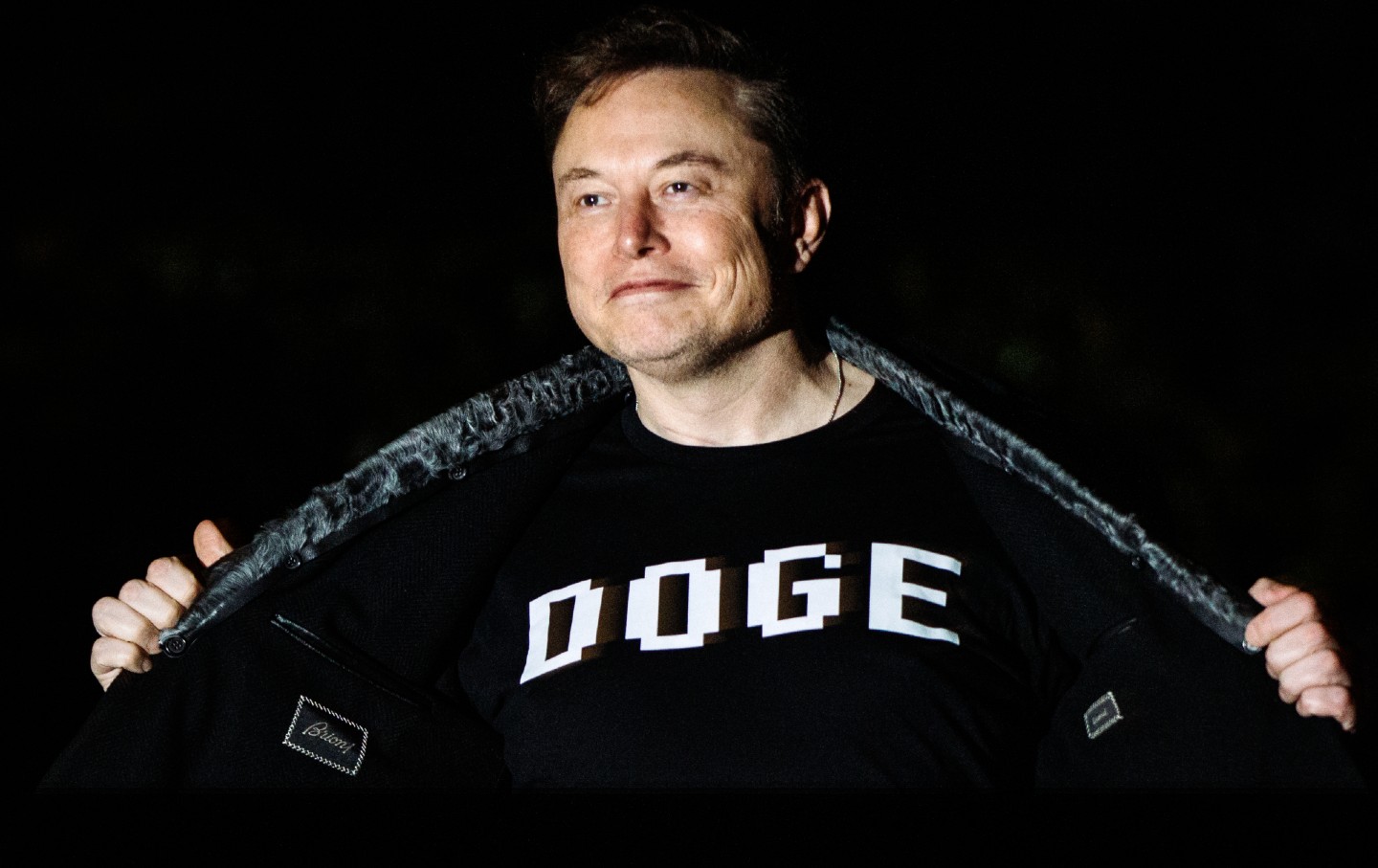What happens when you mix ketamine, ecstasy, and mushrooms with far-right ideology? Spoiler: The results aren’t pretty.

In the last few years, the mind of Elon Musk has dramatically moved in two directions, one lateral and the other vertical. Ideologically, he has shifted from a moderate big-business centrist who supported Barack Obama to a far-right partisan of Donald Trump, a White House adviser whose contentious tenure ended last Wednesday. Cognitively, Musk has gone from being hyperbolic but still grounded in reality to being—or so it would seem—almost permanently high as a kite. That metaphor might be too dated for the high-tech Musk, the futurist behind Space-X and Starlink. Perhaps it is more accurate to say he’s as a high as a satellite circling in the exosphere—and is occasionally on the verge of leaving earth’s orbit altogether to go careening out of the solar system entirely.
The fact that Musk is a user of ketamine and other mind-altering substances has long been known. As I pointed out in March, Musk’s “use (or abuse) of illicit drugs—including LSD, cocaine, ecstasy, and mushrooms, as well as ketamine—has been reported by such reputable outlets as The Wall Street Journal.” On Friday, The New York Times published an extensively documented article that made clear that Musk’s drug uses is even more intense and undisciplined than the earlier reporting had outlined:
Mr. Musk’s drug consumption went well beyond occasional use. He told people he was taking so much ketamine, a powerful anesthetic, that it was affecting his bladder, a known effect of chronic use. He took Ecstasy and psychedelic mushrooms. And he traveled with a daily medication box that held about 20 pills, including ones with the markings of the stimulant Adderall, according to a photo of the box and people who have seen it.
This account mostly focuses on the months before the last election, although there is no reason to think Musk has moderated his drug intake more recently. The Times article is personality-focused. It also frames the drug use in terms of Musk’s increasingly “erratic” behavior, including his convoluted personal life. This “erratic” behavior includes giving a fascist salute at a Trump inauguration event. As an outgrowth of his “pro-natalist” ideology which argues that people of superior intelligence need to populate the earth, Musk has 14 “known” children from multiple women leading to ongoing custody battles (there are reports that the actual Musk brood is much larger, since there are numerous as yet unacknowledged progeny). Ashley St. Clair, who gave birth in February to the latest little Muskling, says he told her “would be willing to give his sperm to anyone who wanted to have a child.”
Obviously, Musk’s bizarre personality is a factor in his freaky behavior, including his epic drug consumption. But it is a mistake to treat Musk as an isolated oddball or to disassociate his actions from their political context. Musk’s appetite for mind-altering substances and his increasingly strident support for far-right ideology in fact go hand-in-hand. On April 28, Jules Evans, of the Psychedelic Challenge Project, published an intriguing essay in The New York Times arguing that “a once left-wing psychedelic movement” has become “tightly intertwined” with the Trump administration. The evidence Evans provides is revealing: Silicon Valley Trump supporters such as Peter Thiel are investing in psychedelics and Health and Human Services Secretary Robert F. Kennedy Jr. (who reportedly sold cocaine as an Harvard undergraduate) is an enthusiast for using psychedelics as treatment for trauma.
But the historical narrative Evans presents—that psychedelics were once the provenance of left-wingers interested in hippy ideals of peace and consciousness expansion, but are now embraced by right-wingers interested in making money—is false. In truth, mind-altering drugs are a tool and have for many decades (if not centuries) been used by the right as well as the left.
In the early 19th century, the most prominent drug users in British culture were high Tories such as Samuel Taylor Coleridge and Thomas De Quincey (author of the vivid 1821 memoir, Confessions of an English Opium-Eater), who were rabid haters of Jacobins and pro-democracy movements. Their imaginations deep in opium reveries, these literary giants penned essays rich in gothic imagery to express their reactionary disdain for modernity.
Current Issue

In his book Blitzed: Drugs in Nazi Germany (2015), the historian Norman Ohler highlights the fact that Hitler’s regime had a strong affinity for methamphetamine, commonly known as meth. The drug (which was legal at that time) was an important fuel for the Nazi war machine, which used meth as an energizing agent for soldiers (since it reduced both fear and the need for sleep).
Closer to home, some American libertarians have long been friendly to drug culture. As Brian Doherty documents in his entertaining book Radicals for Capitalism (2007), in the 1950s a group of militantly libertarian businessmen associated with the Foundation for Economic Education became unlikely experimenters with the newly discovered drug LSD (then legal). This group included William C. Mullendore, a former assistant to Herbert Hoover and onetime vice president of South California Edison as well as the high-powered lawyer James Ingebretsen. In the early 1950s, this group—normally given to union busting and pushing for a rollback of the New Deal—fell under the sway of the New Age guru Gerald Heard (who also on occasion served as the spiritual mentor to cultural figures like the poet W.H. Auden and the novelist Aldous Huxley). Perhaps because they felt so alienated from an America where Social Security became unassailable and union density was high, they turned to mind-altering drugs to offer a path to an alternative reality.
Under Heard’s celebration of spiritual expansion, Doherty notes, “this squad of spiritually seeking high-bourgeois industrialists and professionals lived out a first wave of psychedelic adventurism, before the more populist one of the mid-to late 1960s.” Of course, the rich are used to seeing the world as their playground, one where they can take risks they wouldn’t necessarily want to share with the plebes. In that spirit, as Sam Tanenhaus describes in his new biography of William F. Buckley Jr., in the late 1960s Buckley and fellow National Review editor James Burnham (both fierce elitists) experimented with LSD.
San Francisco in the 1960s was home to both the counterculture and the burgeoning tech sector. In 1961, the engineer Myron J. Stolaroff started the International Foundation for Advanced Study in Menlo Park, California, to promote the use of psychedelics as a tool for creativity. As the writer Malcolm Harris notes in his 2023 book Palo Alto, “acid was marketed to Bay Area knowledge workers as a productivity aid from the beginning.” Harris observes that this tradition lives on in the recent “surge of interest in ‘microdosing,’ now a popular performance-enhancing method in Silicon Valley tech circles that involves taking tiny amounts of LSD before work.”
It’s this Silicon Valley culture of using drugs to enhance mental performance that most clearly shaped Musk. But in parallel with the Silicon Valley drug culture, there is a more hedonistic culture around Donald Trump (who himself is personally averse to drinking and drugs). As a Rolling Stone reported in 2024, the first Trump administration was “awash” in speed and Xanax.
Among the right, drugs like ketamine used not merely used in a utilitarian spirit to get a competitive edge over rivals but are tied to a larger ideology of caste superiority. Musk has a savior complex, one tied to his sense that he’s a figure of destiny with a mission to “make life multiplanetary & extend the light of consciousness to the stars.” In other words, Musk sees himself as a Nietzschean Übermensch— beyond the mundane norms of good and evil. But sometimes even an Übermensch needs a little help to access his superpowers. In comic books, this is usually done via exposure to radiation; in real life from performance-enhancing drugs. (Not accidentally, Musk is a huge fan of Frank Herbert’s science fiction epic Dune [1965], where a combination of drugs and genetic engineering produces a superman. What Musk misses is that Herbert’s novel is a critique of this fascist plan).
Popular
“swipe left below to view more authors”Swipe →
Anyone who does drugs knows the real danger is not just overdosing but also mixing them up for a too potent concoction. In Musk’s case, he’s mixed together not just many potent drugs but added in the even more toxic mind-altering powers of right-wing ideology.
Writing in the psychoanalytical journal Parapraxis, the scholar Taija Mars McDougall, currently a postdoctoral fellow at the University of California, reflected on what happens when you mix ketamine with an elitist ideology. She notes that ketamine is “the drug of our time” just as earlier eras were also defined by different drugs (the sixties by marijuana and LSD, the 1970s with cocaine).
McDougall calls attention to the writings of Musk’s Silicon Valley ally Marc Andreessen, whose 2023 essay “The Techno-Optimist Manifesto” has a chapter called “Becoming Technological Superman.” In that chapter, Andreesen (who is also personally abstentious) writes, “We are not primitives, cowering in fear of the lightning bolt. We are the apex predator; the lightning works for us.”
Ketamine, McDougall suggests, is the lightning that Musk sees as allowing him to become an apex predator and dominate all the primitives who are not ready to become supermen. Given Musk’s own embrace of racism—notably his promotion of the “white genocide” lie—it is not hard to conclude that the “primitives” in this scenario are people who traditionally are racially marginalized.
As McDougall argues:
When those who are at the levers of the powerful nexus of technology and finance are using ketamine therapeutically, recreationally, and beyond, it feels indicative of the economic significance of Musk’s own willingness to over-leverage—taking on increasingly pernicious amounts of debt for the sake of, say, buying Twitter—and the techno-optimist’s willingness to over-leverage to become the apex predator. Through ketamine, we might glean an understanding of … the perniciousness of an unbounded white psyche, its fantasies of technodominance, and what the disciples of such a movement are willing to pledge to achieve it come together in a figure like Musk.
In her rich essay, McDougall draws on her own personal experiences using ketamine to make a persuasive case that Musk’s descent into ideological fantasy (complete with paranoia and a disregard for contrary evidence) has been exacerbated by his drug use.
It’s regrettable that Musk has become the ugly public face of the new psychedelic revolution. As Jules Evans rightly notes, there is a class dimension to how plutocrats have hijacked promising therapeutic discoveries:
Many members of the millionaire and billionaire class have found meaning, healing and joy in psychedelics, and they want to bring that to the masses. (Take any of the big American dynasties—the Gettys, Rockefellers, Mellons, Kochs, Hearsts—and you’ll probably find a member who has given money to psychedelic causes.) They may dismiss concerns about safety as sensationalism or drug war propaganda, but their resources provide them access to months of therapy and time off work to recover after a bad trip. Most Americans don’t have that luxury.
Evans rightly calls for “a better public safety net for psychedelics.” Drugs like ketamine, mushrooms, and LSD could indeed enrich humanity. They are too valuable to be just left to the Nazis. As for Musk, he needs to go cold turkey—not just on drugs but also on the fantasy that he’s a racial superman.
More from The Nation

At the steps of the Statue of Liberty on Sunday, I organized more than 50 people to turn our grief into a collective demand: Free the 238 men unlawfully disappeared into CECOT.
Paola Mendoza

The shortage can be addressed not through costly new development but by reusing existing buildings.
Kate Wagner

Pregnant people are undergoing constant horrors at the hands of the carceral state, and the laws we’ve passed aren’t helping enough.
Ira Memaj

As the Supreme Court debates this case, I am reminded of the students I taught over two decades ago who gave me an invaluable lesson about what representation really means to them…
George Theoharis

A graphic episode from Do Admit: The Mitford Sisters and Me.
Feature
/
Mimi Pond

While the courts continue to debate the legality of Trump’s sweeping tariffs, the law remains clear: They are unconstitutional.
Elie Mystal


